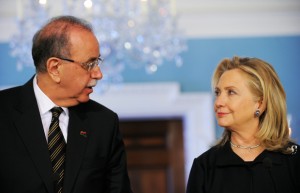Special to WorldTribune.com
WASHINGTON — The United States said it has restored military
cooperation with Libya.
Officials said the administration of President Barack Obama has renewed
defense and military cooperation with the interim government that replaced
the late Col. Moammar Gadhafi in 2011. They said the cooperation could
result in U.S. help to build and equip Libya’s military.

“We’ve established a military-to-military dialogue and we’ve also begun, again, a good cooperation in counterterrorism,” a senior administration official said.
In a briefing on March 8, the official reviewed cooperation between
Tripoli and Washington amid the visit by Libyan Prime Minister Abdul Rahim El Keib. El Keib, who met President Barack Obama as well as Secretary of State Hillary Clinton, is said to have agreed to extensive military as well as energy cooperation with Washington.
“We have been working very hard with them, along with the international community, on the conventional weapons [stolen from Gadhafi’s arsenal],” the official said. “We in Libya have worked together to account for nearly 5,000 such weapons, the MANPADS [man-portable air defense systems] and the components.”
Defense Secretary Leon Panetta said some of the stolen Libyan weapons were smuggled to Egypt’s Sinai Peninsula. Officials said, however, that most of
the missiles and rockets were believed to have been taken by Libyan
militias.
The administration official did not cite U.S. plans to restore defense
cooperation with Libya. But other officials said the Defense Department and
the State Department were examining options to build and develop Libya’s
military and security forces in 2012.
For his part, El Keib did not rule out the resumption of Russian
military projects. The prime minister said each Russian contract that had
been signed with Gadhafi would require examination.
“Are we willing to see Russians in Libya again?” El Keib asked. “Yes,
probably, if those contracts do not benefit the deposed regime and have no
ties with it. Will we extend Russian contracts? Theoretically, yes, but only
after we study them and confirm that they are in line with the legislation
and are not blemished by corruption.”

You must be logged in to post a comment Login